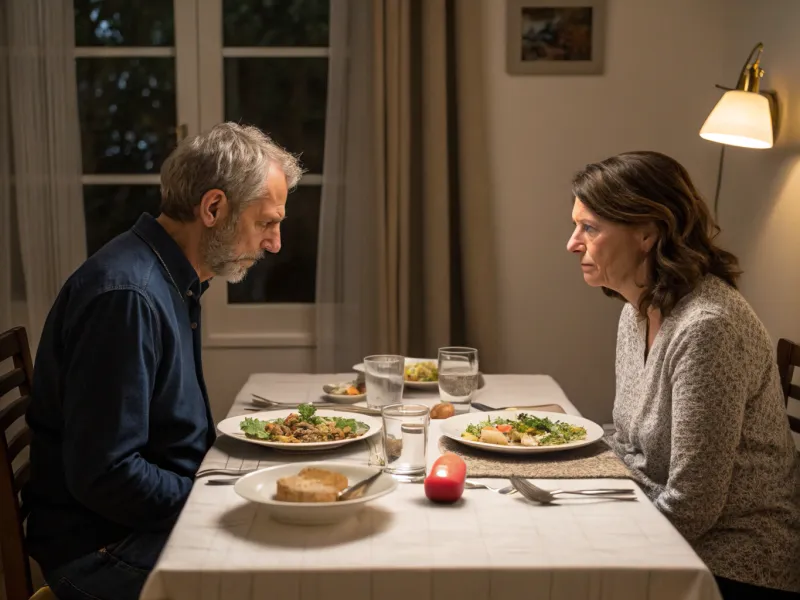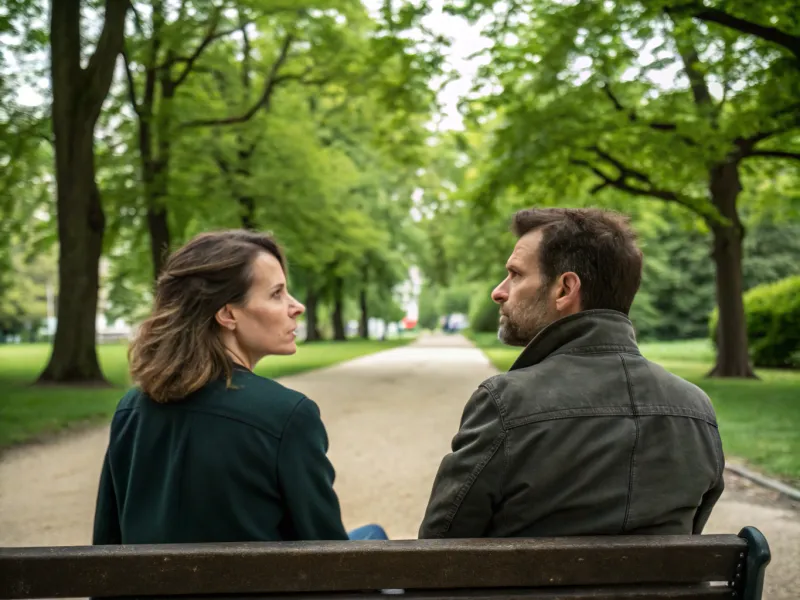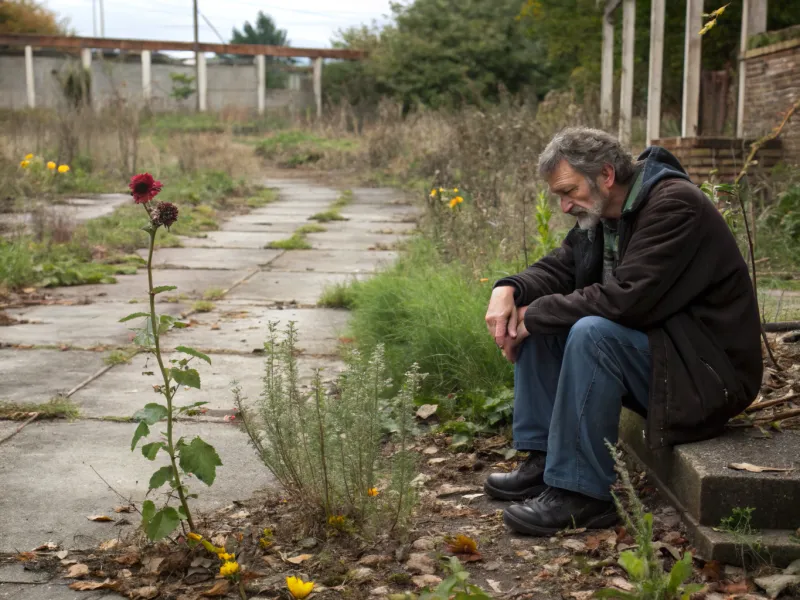32 señales desgarradoras de que tu matrimonio no tiene arreglo
There comes a moment in every struggling marriage when you have to confront the heartbreaking reality that things might not ever get better. It’s painful to acknowledge, especially after years of shared memories, dreams, and promises.
Pero a veces, reconocer las señales es el primer paso hacia la curación, aunque signifique dejar ir. Esta lista no pretende culpar ni encontrar culpables, sino ayudarte a ver la verdad con claridad y compasión.
Estas señales pretenden servir de guía y consuelo mientras navegas por la tormenta emocional de un matrimonio que podría no tener salvación.
1. You feel more at peace when they’re not around than when they are

Have you found that your heart feels lighter when they’re away? It’s as if their presence has become a shadow over your spirit. This isn’t about enjoying solitude or needing space. It’s a deeper sense of relief that descends when they’re absent, perhaps because the tension, arguments, or unspoken resentments take a temporary leave too.
Being alone should not bring more peace than being with the one you vowed to share your life with. It’s a sign that the emotional connection has frayed, leaving behind only the harsh realities of a broken bond.
Sometimes, the peace in their absence is louder than the silence you share together. It speaks to a fundamental disconnect that, over time, makes the idea of their presence synonymous with unrest. If you find yourself dreading their return, it’s a signal that something profound within the marriage might be irreparably broken.
Véase también: 31 señales de alarma que indican que es hora de dejarlo ir
2. Las conversaciones se sienten forzadas, vacías o completamente ausentes

La comunicación es la línea vital de cualquier relación, pero aquí está usted, luchando incluso por reunir un simple intercambio de palabras. Antes, las conversaciones fluían sin esfuerzo, llenas de sueños compartidos y risas. Ahora, se sienten más como un deber, realizadas por obligación que por interés genuino.
When every word feels burdened with the weight of what’s left unsaid, it becomes easy to retreat into silence. Silence, however, isn’t always golden. In your case, it might be the quiet acknowledgment that there’s nothing left to discuss.
Si los diálogos se han convertido en monólogos, o peor aún, en vacíos de comunicación, puede indicar que la los puentes que unen sus vidas se han derrumbado. La falta de conversaciones significativas puede ser una señal desgarradora de que la intimidad emocional y la comprensión que una vez os unió se han deshecho.
3. One or both of you have stopped putting in effort—because it no longer seems worth it

Remember the days when both of you would go out of your way to bring a smile to each other’s faces? Those moments now seem like remnants of a distant past.
It’s not just about forgetting anniversaries or neglecting to call during the day. It’s about the absence of effort in nurturing the relationship, in trying to understand and support each other. When the spark of effort dims, it suggests a deeper, more troubling reality—that you no longer believe the relationship is worth the investment.
Esta falta de esfuerzo es un reconocimiento silencioso pero poderoso de que el amor y la conexión que una vez alimentaron su compromiso se están desvaneciendo. Cuando las acciones que solían ser naturales ahora requieren una deliberación consciente, puede ser una señal de que la relación ha perdido su vitalidad y propósito.
4. El resentimiento ha sustituido al amor, y el perdón parece imposible

El resentimiento es una emoción poderosa, que puede erosionan silenciosamente los cimientos de un matrimonio without either partner realizing it. It’s the accumulation of past grievances, the unresolved conflicts that have festered over time.
The once tender feeling of love becomes overshadowed by the bitterness of resentment. Forgiving becomes an insurmountable hurdle, not because you don’t want to, but because the wounds run too deep.
If every interaction is tinged with resentment, where forgiveness feels like an act of betrayal to yourself, it’s a sign that the emotional chasm between you might be too wide to bridge. Resentment, when left unchecked, can consume the love that once was, leaving nothing but the ashes of what used to be a vibrant and loving connection.
5. You’ve both become more like roommates than romantic partners

Vivir juntos no equivale automáticamente a compartir una vida. Hay una gran diferencia entre ser pareja y simplemente cohabitar bajo el mismo techo.
When the relationship devolves into a pattern of routine and indifference, it suggests that the intimacy and passion have faded. You’re sharing a space but not a life.
La transición de pareja a compañero de piso suele producirse de forma gradual, casi imperceptible, hasta que un día te das cuenta de que la persona con la que solías compartir sueños se ha convertido en una presencia más en la casa. Esta transformación es un recordatorio conmovedor de que el amor y la conexión que antes os unían han sido sustituidos por la mera comodidad y la costumbre.
6. La idea de permanecer juntos se siente más como una obligación que como una elección

Staying together for the sake of appearances, for the children, or because it’s what’s expected can slowly suffocate the soul. What was once a conscious choice born out of love becomes a burdensome obligation dictated by duty and societal expectations.
When the idea of leaving brings relief rather than fear, it’s a sign that the emotional ties have weakened to the point where obligation overshadows genuine affection.
Este sentimiento de obligación más que de deseo puede indicar que la relación ha llegado a un punto en el que la conexión emocional ya no es viable. It’s a heavy realization, one that can weigh heavily on the heart, as you grapple with the dichotomy between what’s expected and what you truly feel.
7. You’ve lost yourself in the marriage, and you no longer recognize who you are

In trying to make a relationship work, it’s easy to lose sight of who you are as an individual. The lines between where you end and your partner begins can blur, leaving you feeling lost and disconnected from your own identity.
When your dreams, desires, and even personality become secondary to the marriage, it indicates that the relationship is overshadowing your true self. This loss of identity isn’t just a personal crisis; it’s a sign that the marriage is consuming rather than complementing you.
Rediscovering yourself can be difficult when the marriage feels like a maze with no exit. It’s a heartbreaking realization, but acknowledging it might be the first step towards reclaiming your individuality, whether within the marriage or outside of it.
8. One or both of you have emotionally checked out, and there’s no desire to reconnect

Emotional absence is often more telling than physical absence. You might still be physically present, sharing meals or sleeping in the same bed, but emotionally, you’re worlds apart.
When the emotional connection has deteriorated to the point where neither of you feels inclined to bridge the gap, it’s a sign that the heart of the relationship has stopped beating.
La desconexión emocional puede ser un enemigo silencioso, que se arrastra inadvertidamente hasta que el vínculo que una vez los mantuvo unidos no es más que un frágil hilo. Si ninguna de las partes desea reavivar la intimidad emocional, puede indicar que la relación ha llegado a un punto irreparable.
Véase también: 27 temas de conversación sobre el divorcio para usted y su cónyuge
9. Evitar la intimidad y la conexión física

La intimidad física es un componente vital de una relación sana, y su ausencia puede ser tanto síntoma como causa de problemas más profundos.
When touch, once a natural and cherished expression of love, becomes something to avoid, it highlights a growing distance. This avoidance isn’t just about physical touch; it extends to all forms of intimacy, including emotional and intellectual.
The lack of intimacy creates a gap, one that can widen over time, leading to feelings of isolation and loneliness. If there’s a perpetual avoidance of connecting on an intimate level, it could signify that the relationship is struggling to survive.
10. Crítica y desprecio constantes

La crítica y el desprecio son fuerzas destructivas en cualquier relación. Cuando cada conversación parece acabar en una discusión, en la que las palabras se esgrimen como armas, se crea un ambiente de hostilidad y desconfianza.
Lo que antes era una asociación se convierte en un campo de batalla en el que ninguna de las partes se siente escuchada o respetada. Las críticas, sobre todo cuando son constantes, erosionan los cimientos del amor y la confianza.
El desprecio es aún más corrosivo, ya que significa un resentimiento profundamente arraigado y una falta de respeto hacia la otra persona. Si la crítica y el desprecio se han convertido en la norma, puede indicar que la relación está en graves problemas, al borde de un daño irreparable.
11. Sentirse atrapado sin salida

The feeling of being trapped in a marriage is both suffocating and isolating. It’s a sense of being stuck in a situation with no clear escape route, where every option seems to lead to more pain and confusion.
This feeling can stem from various factors—fear of being alone, financial dependency, or concern for children. Regardless of the cause, the result is a profound sense of helplessness.
Feeling trapped is a sign that the marriage no longer provides the safety and comfort it once did. It’s a heartbreaking realization, as you grapple with the internal conflict between wanting to break free and fearing the unknown path ahead.
12. Falta de objetivos compartidos o planes de futuro

Having shared goals and future plans is what propels a relationship forward. It’s the excitement of building a life together, the anticipation of shared dreams realized.
Cuando esos planes se disipan, dejando atrás sólo las rutinas mundanas de la vida cotidiana, es señal de un alejamiento de la visión y el propósito.
La ausencia de un futuro compartido can make the present feel stagnant and directionless. It’s as if the compass that once guided your journey together has lost its needle. If there’s a persistent void where future plans once flourished, it might signify that the marriage is struggling to find its way.
13. La confianza se rompe y no se puede reconstruir

La confianza es la base de cualquier relación significativa. Sin ella, el amor se ve ensombrecido por la duda y la sospecha.
Si la confianza se ha roto, ya sea por traición o engaño, y los esfuerzos por reconstruirla han sido infructuosos, la relación es vulnerable al colapso.
La incapacidad de confiar crea un trasfondo constante de incertidumbre que dificulta el avance. Si no se puede restablecer la confianza, puede ser señal de que la relación ha llegado a un punto en el que ya no es posible la curación.
14. You feel like you’re living a lie

Pretending that everything is fine when it’s not is exhausting. It’s the act of putting on a brave face and pretending for the sake of others, or even for yourself.
Vivir una mentira crea un abismo entre tu persona pública y tu desesperación privada. Puede ser una señal de que el matrimonio ya no es una fuente de alegría y autenticidad, sino más bien una fachada que hay que mantener.
Cuando el esfuerzo por mantener las apariencias se vuelve abrumador, puede indicar que la relación no tiene arreglo y que hay que afrontar la verdad, por dolorosa que sea.
15. La indiferencia ha sustituido a la pasión

Passion is what fuels the connection between two people. It’s the fire that keeps the relationship vibrant and alive.
When passion wanes and is replaced by indifference, it signifies a deeper disconnection. Indifference is more than just a lack of interest; it’s the absence of care, where the emotional response is muted or nonexistent.
If passion has faded into indifference, and there’s no desire to reignite the flame, it may indicate that the relationship is struggling to survive.
16. Fantaseas con una vida sin ellos

Fantasear con una vida sin tu pareja is a sign that your subconscious is trying to tell you something. It’s not about harmless daydreams but rather a persistent longing for a different reality.
Estas fantasías pueden ser una vía de escape de la insatisfacción y la infelicidad que se han instalado en el matrimonio.
Cuando la idea de una vida sin ellos suscita más alegría y esperanza que la realidad actual, puede indicar que la relación ha llegado a un punto en el que la posibilidad de ser feliz parece más alcanzable separados que juntos.
17. There’s a lingering sense of loneliness even when you’re together

Loneliness within a marriage is a unique kind of solitude. It’s the feeling of being alone, even when you’re physically with your partner. This loneliness stems from a lack of emotional connection and understanding.
It’s as if the bond that once tied you together has loosened, leaving you adrift in a sea of isolation.
Si la presencia de su pareja no consigue aliviar los sentimientos de soledad, podría indicar que la relación está luchando por proporcionar la compañía y el apoyo que una vez proporcionó.
18. Evitan pasar tiempo juntos

Spending time together is essential for maintaining a healthy relationship. It’s the shared moments that strengthen the bond and create lasting memories.
When you find yourself actively avoiding time together, it signals a deeper issue. This avoidance isn’t about needing space; it’s a reluctance to engage with the relationship itself.
Si pasar tiempo juntos se siente más como una tarea que como un placer, podría indicar que la relación lucha por sobrevivir.
19. Discusiones constantes sin resolución

Las discusiones son una parte natural de cualquier relación, pero cuando se convierten en una constante sin solución, es señal de un problema más profundo.
Las discusiones constantes crean un ambiente de tensión y hostilidad, en el que ninguno de los dos se siente escuchado o comprendido.
Si las discusiones son circulares y siempre vuelven a los mismos temas sin resolver, podría indicar que la relación se encuentra en un estado de estancamiento, incapaz de avanzar o sanar.
20. Ya no compartes risas y alegrías

La risa es un poderoso conector, un signo de alegría y felicidad compartidas. Cuando la risa desaparece, sustituida por el silencio o la indiferencia, indica una pérdida de conexión y compañerismo.
La ausencia de alegría crea un vacío que puede hacer que la relación se sienta sin vida y aburrida.
If you no longer find joy in each other’s company, it might be a sign that the relationship has lost its vitality and spark.
21. Te sientes emocionalmente agotado en lugar de realizado

Una relación sana debe ser una fuente de alimento y apoyo emocional. Cuando se convierte en una fuga emocional, significa que hay un problema más profundo.
Sentirse emocionalmente agotado can stem from constant conflict, unmet needs, or a lack of emotional reciprocity. It’s as if the relationship is taking more than it’s giving.
Si se siente agotado en lugar de satisfecho, puede indicar que la relación tiene dificultades para proporcionarle el apoyo y el alimento que antes le proporcionaba.
22. You’ve stopped caring about things that once mattered

In a thriving relationship, partners care about each other’s interests and priorities. When this caring fades, it signals a deeper disconnection.
It’s the little things that once mattered—celebrating achievements, supporting dreams—that now seem insignificant.
If you’ve stopped caring about the things that once mattered, it might indicate that the relationship’s emotional core is eroding, leaving behind a shell of what once was.
23. El pensamiento de intimidad se siente pesado

La intimidad debe ser una fuente de consuelo y conexión, no una carga. Cuando la idea de intimidad te resulte abrumadora o no deseada, destaca una distancia cada vez mayor.
This burden isn’t just physical; it extends to emotional and intellectual intimacy as well. It’s the feeling of not wanting to share or connect, as if the effort required is too great.
Si pensar en la intimidad se siente más como una carga que como una alegría, podría indicar que la relación está luchando por proporcionar la conexión y la cercanía que una vez proporcionó.
24. La relación parece una constante lucha de poder

Una relación sana debe ser una asociación, no un campo de batalla. Cuando parece una lucha constante por el poder, indica un desequilibrio más profundo.
This struggle isn’t just about control; it’s about dominance, where one partner feels the need to assert authority over the other.
Si la relación se parece más a una competición que a una colaboración, puede ser señal de que la pareja ha pasado del amor a la rivalidad, creando un ambiente tóxico.
25. You’ve stopped making plans together

Hacer planes juntos es señal de una relación sana y centrada en el futuro. Cuando esos planes desaparecen, queda una sensación de estancamiento e incertidumbre.
The absence of planning doesn’t just indicate a lack of interest in shared activities; it highlights a deeper disconnection.
If you’ve stopped making plans together, whether for the weekend or the future, it might indicate that the relationship is struggling to find its direction and purpose.
26. La relación parece más transaccional que emocional

Una relación debe basarse en una conexión emocional, no en transacciones. Cuando empieza a parecerse más a una serie de intercambios, indica un cambio de la compañía a la comodidad.
Esta naturaleza transaccional puede crear una sensación de distanciamiento, en la que la relación se reduce a lo que cada persona puede obtener en lugar de lo que puede dar.
Si la relación parece más transaccional que emocional, puede ser una señal de que se ha perdido el núcleo emocional, dejando atrás una relación de conveniencia más que de conexión.
27. You’re constantly walking on eggshells

Walking on eggshells creates a constant undercurrent of tension and anxiety. It’s the feeling of having to carefully choose your words and actions to avoid conflict or upset.
Esta cautela constante puede crear un ambiente de miedo e inhibición, en el que se reprime la comunicación auténtica.
Si te encuentras constantemente caminando sobre cáscaras de huevo, podría indicar que la relación está luchando para proporcionar un ambiente seguro y de apoyo.
28. There’s a lack of gratitude and appreciation

La gratitud y el aprecio son esenciales para alimentar una relación sana. Cuando estos elementos están ausentes, se crea una sensación de abandono e infravaloración.
The lack of gratitude can foster resentment, as efforts go unrecognized and unappreciated. It’s as if la relación se ha convertido en un esfuerzo unilateraldonde dar se recibe con indiferencia.
29. La relación se siente estancada e inmutable

Stagnation in a relationship creates a sense of monotony and disinterest. It’s the feeling of being stuck in a cycle that never evolves or progresses.
Este estancamiento puede provocar sentimientos de insatisfacción y frustración, ya que la relación no crece ni se adapta.
30. Evita abordar las cuestiones

Evitar los problemas es una forma de negaciónuna forma de eludir las verdades incómodas que hay que afrontar.
Esta evasión crea una acumulación de conflictos sin resolver, donde los problemas se enconan y crecen en lugar de ser abordados.
31. Ya no te sientes inspirado o motivado

La inspiración y la motivación son vitales para el crecimiento personal y relacional. Cuando estos elementos desaparecen, se crea una sensación de apatía y estancamiento.
This lack of inspiration can affect not only the relationship but also individual aspirations and dreams. It’s as if the relationship has become a weight, holding you back rather than lifting you up.
Si ya no se siente inspirado o motivado, podría indicar que la relación está luchando por proporcionar el estímulo y el apoyo que una vez proporcionó.
32. There’s a constant fear of the relationship ending

Miedo a que la relación termine creates a constant undercurrent of anxiety and insecurity. It’s the fear of losing something that was once valuable and cherished.
This fear can create a self-fulfilling prophecy, where anxiety and doubt contribute to the relationship’s decline.







